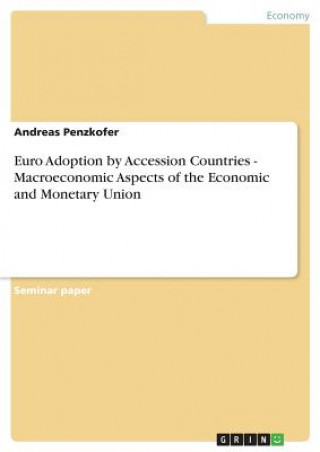
Livrare
Consilier de cumpărături





Nu se pretează? Nu contează! La noi puteți returna bunurile în 30 de zile
 Voucher cadou
orice valoare
Voucher cadou
orice valoare
Cu un voucher cadou nu veți da greș. În schimbul voucherului, destinatarul își poate alege orice din oferta noastră.
Euro Adoption by Accession Countries - Macroeconomic Aspects of the Economic and Monetary Union
 engleză
engleză
 151 b
151 b
30 de zile pentru retur bunuri
Ar putea de asemenea, să te intereseze


Seminar paper from the year 2006 in the subject Economics - Macro-economics, general, printed single-sided, grade: 1,0, Wayne State University (Department of Economics), course: Macroeconomics, 26 entries in the bibliography, language: English, abstract: On 1st May 2004 ten new member states joined the European Union (EU), e.g. Estonia, Poland and Slovenia. The countries won t adopt the euro as their new currency immediately, because they first have to show that their economies have converged with the economy of the euro zone.Presently, the efforts and opinions of the new members differ about the adoption of the single currency. For instance, the Slovenian Prime Minister Janez Jansa told the press in February 2006 that there is nothing on the path ahead that could endanger the euro adoption in 2007. The government pursues a tight fiscal policy to meet all entry requirements. Recently, it introduced a dual pricing that means all prices of goods and services are marked in tolars as well as euros to raise consumer awareness in the preparation for the euro adoption.1 Contrarily, other countries are skeptical. The leader of the Polish conservative party Jaroslaw Kaczynski said during a campaign that he doesn t see any benefits in adopting the euro. Euro adoption would lead to lower exports, lower national income and higher unemployment. The Estonian Sirje Karu said in an interview, that Estonians are scared. We heard that when Finland adopted the euro, it took them quite a while to get used to it and prices increased. The poorest suffered. Using this situation as a background, it is interesting to analyze the euro adoption by accession states. How does the adoption process work? When should the euro be introduced and what macroeconomic effects does it have?
Informații despre carte
 engleză
engleză
Categorii




 Cum să cumpăr
Cum să cumpăr

























